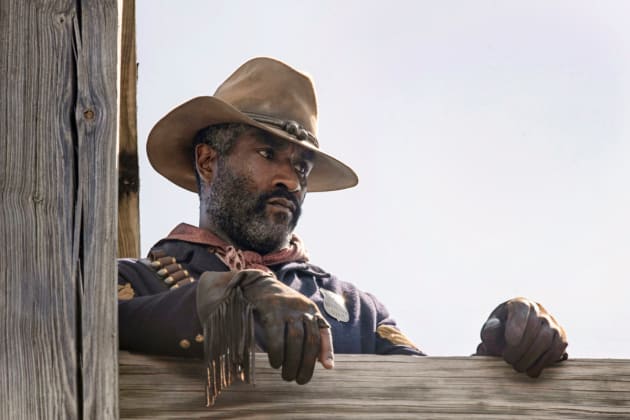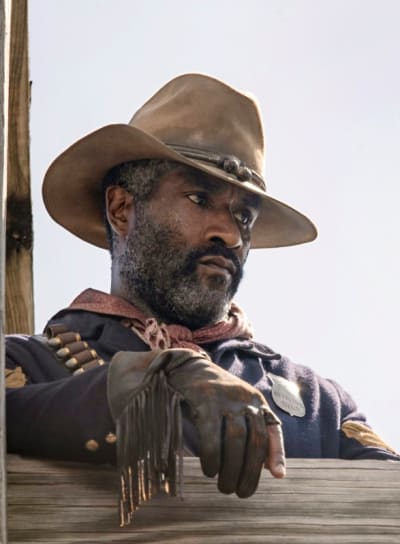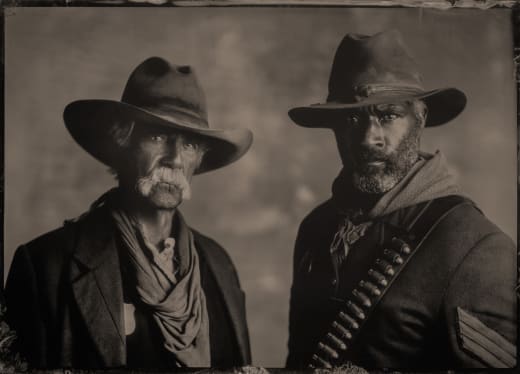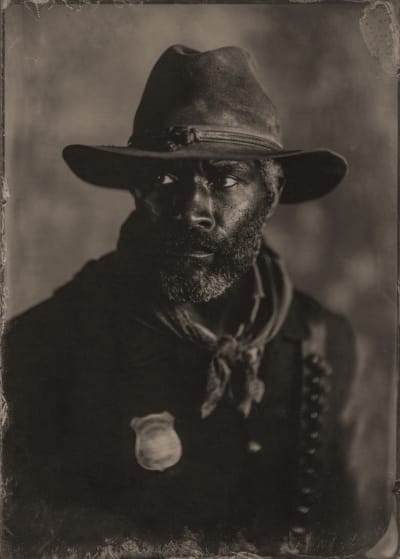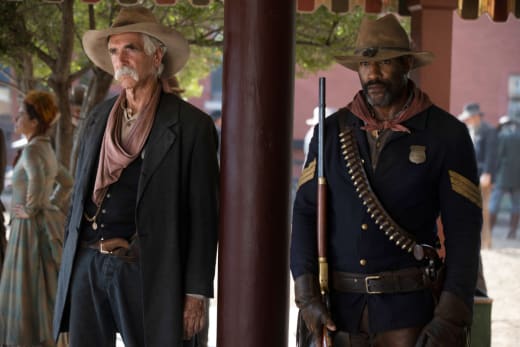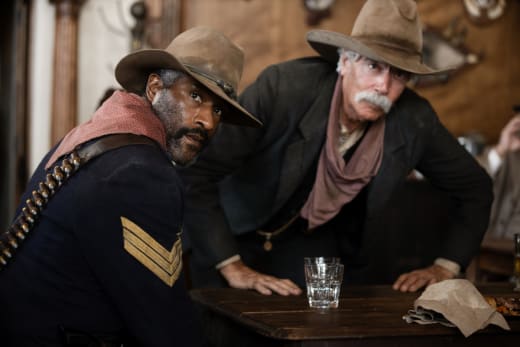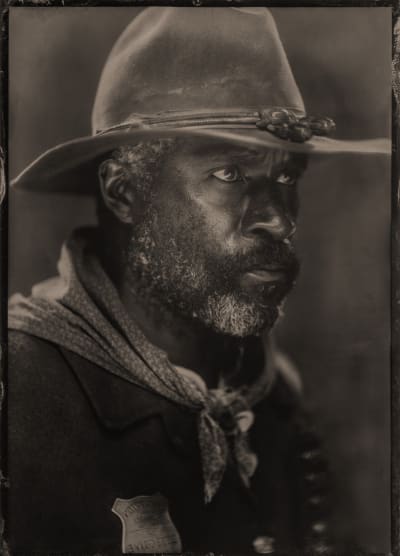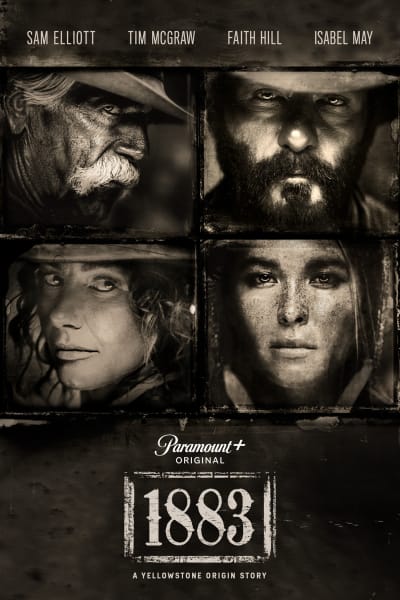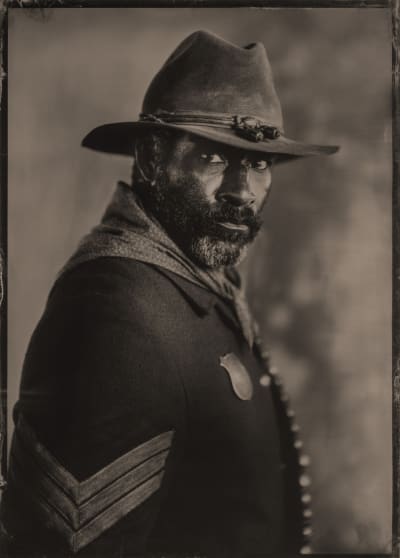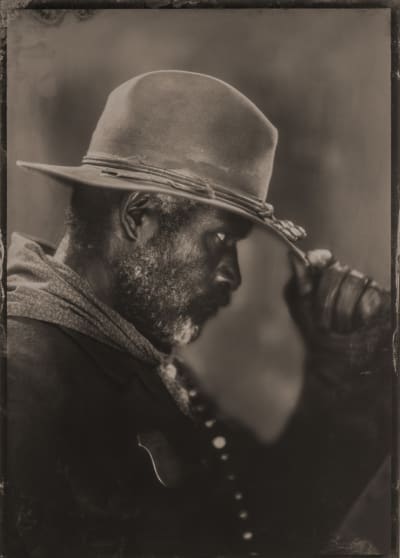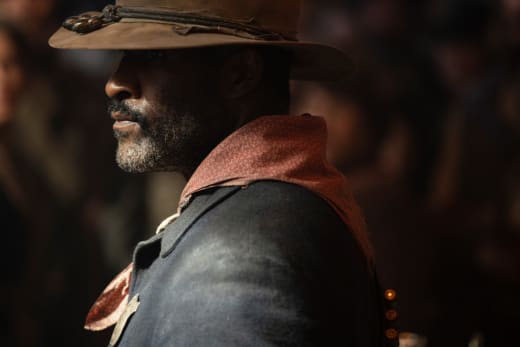Yellowstone is a hit for Paramount Network, and it’s spawning a series of sister shows in the same universe.
Beginning Sunday, LaMonica Garrett takes the stage as Thomas, the right-hand man, to Sam Elliott’s Shea Brennan on 1883, the series following the Dutton saga as they find their way to Montana.
The Paramount+ series hosted a press day, and TV Fanatic joined four other outlets for a Q&A session with the show’s stars. Enjoy the details as you get ready to sink your teeth into 1883, which drops two episodes on Sunday, December 19.
*** Reporters’ questions are in italics, and LaMonica’s answers follow.***
What a great show. First two episodes, a lot to take in. So my question for you is, what drew you to wanting to be a part of this series?
A lot of things. Taylor… his writing, for one, you just want to be a part of that world and be a part of some of his projects. And this story being told, and when I read my character’s breakdown, and what he was about and then I started reading scripts, these roles don’t come around often, and I wanted to be the one to tell Thomas’ story.
The show’s fantastic and you’re really wonderful in it. So, how would you describe Thomas and his interactions with both Shea and James? They’re very different relationships.
Shea and Thomas have a deep history together; they served in the war together, the right-hand knows what the left is doing, and they’re brothers at this point. They can communicate and say so much without saying a word together, just sitting around the camp.
They know each other. And James, he’s there; he has his own reasons for coming along on this journey. And the tension starts from that because when your reasons don’t align with why we’re doing this, it’s going to come off as selfish at some point because you’re doing it for your family.
But, at some point throughout the series, we realize that we can’t butt heads; we have to do this together. If we’re not together on this, then we’re all going to fail. And we have that point to where we come together, and it’s beautiful.
There are so few westerns on TV anymore. What is it like to be a part of… first of all, the Taylor Sheridan universe, which he’s created to great effect, and to bring this portion of history to life for a generation that’s probably never seen it?
Yeah, working with Taylor has been amazing. This is the first time I’ve read scripts where each script that I read, it brings out different emotions, and all of them get me choked up.
That knot in your throat, and that’s from the page. And this is one of the projects. You know how they say, ‘sometimes the book is better than whatever movie’? It was. This translates to the screen. And it’s really wonderful to watch.
And working on a western, I think that’s everybody’s, well, every actor’s bucket list. You want to do it at least once. We all grew up… that’s all that was on TV for a long time, was the Bonanzas, the Gunsmokes, the Wagon Trains. I remember watching these shows with my mom. My mom still watches them. She goes on YouTube, and that’s all she does.
So being able to be a part of a western that I grew up watching, the genre that I… Unforgiven is my favorite movie. And now that we’re telling stories like this, from a different time period, I think people gravitate towards that because you rarely see it these days.
So you’re Sam Elliot’s right-hand man on the show. What’s it like working so closely with him? And what have you learned from him?
What haven’t I learned from him? Sam’s a great dude, he embraced me from the first time that we met, and he calms the nerves of everyone that he comes in contact with, with just his steadiness and his work ethic. And he’s the first one there; he’s the last one to leave.
He said he hadn’t ridden a horse in 20 years before this project, and he’s killing it. He’s inspiring to watch work. And sometimes I have to remember that we are working together because I get caught up looking at him work while I’m in the scene with him.
There was a part coming up in episode three where he gun-butts one of the immigrants. You’ll see when it happens. But to me, I was like… I had the next line, and I had some action that was about to happen after that.
And I caught myself looking at him like, “Wow, that’s how Virgil gun-butted Ike in Tombstone. Just like the same motion. Oh…” Snapped back into it, “All right, it’s time to work right now.” It’s amazing working with Sam, and he’s a great person, and he’s a great actor.
So I wanted to talk to you about your costuming. I think it’s a really unique way to style Thomas. He obviously still wears his Union coat, which is a really big part of him.
And something that I know; it’s a little thing, but his brand is always so low to the perfect place where it’s like it adds to… there’s a menace to it, there’s intimidation to it.
I want to know what part you played in working with the costuming department and coming up with a very specific style for Thomas and how all that developed together.
Taylor had the idea of the Buffalo Soldier, the Union coat. He has a tremendous amount of pride in being that soldier. Coming for a lot of former slaves, back in the 1800s, they went over to the military; they were Buffalo Soldiers, and a lot of those Buffalo Soldiers became cowboys because there was a different kind of freedom.
They moved to Texas, and there’s a rich culture in that. But Thomas’ Buffalo Soldier jacket. They don’t have much. Everything he has in this world is on him and on his horse. And the most important things to him are that coat, his guns, and his horse.
And the hat being low. Thomas is a guy that, he’ll sit in a bar, in the back, and just see everything. He might not say a lot, but he’ll see everything that’s going on and see what potential threats are in here, and he’s protective of Shea.
But that hat being low, it’s like just barely being able to see the eyes, and growing up watching westerns, those mysterious dark characters always had their eyes hidden. But when you see their eyes, it’s for a reason, and something bad’s about to happen.
I keep going back to William Munny with Unforgiven. He hid his eyes a lot, but when he showed his one eye, and he was looking at Gene Hackman, Little Bill, he was about to kill him. You didn’t see his eyes a lot, but when he does, it’s for a reason.
So there’s a lot of action and strenuous activity in 1883. What was the hardest part about preparing for your role?
Learning to ride the horse. I never rode a horse before. Cowboy Camp was tough on us. We did three weeks of Cowboy Camp before we started filming. And that was riding horses, that was learning to drive the wagons, steering the horses, that was roping cattle, herding cattle, shooting.
It was a lot, and that was a challenge. You think Cowboy Camp like, “Oh, that sounds fun. I want to go to Cowboy Camp.” It’s cool for three or four days, but after, it’s a hundred degrees in Texas every day in August, and it’s humid. And we were doing it six days a week, and that was a challenge, but it got all of us closer as a cast. We bonded.
And we all learned something together that we didn’t know before, and that was the cowboy culture. And I got a tremendous amount of respect for cowboys now because I had no idea how hard it was.
To piggyback off of that, was there something at Cowboy Camp that surprised you that you were actually immediately good at? That you were like, “Wow, I didn’t know this.”
I was pretty good at roping. Roping cows, and not just roping them standing still, being on a horse and the cow is running, and you’re getting it, you’re getting it. And I would get the horns a good amount of times. I had to learn how to ride the horse first, but yeah, once I got going on that, the roping came a little easier than the rest of the stuff.
The wagons, they’re not comfortable, they’re not fun. That was their only means of transportation back then; you feel every rock in the road. And I’m a big guy; if you’re a big guy, you’re just getting knocked all around where you sit. It’s not fun. But yeah, roping was a little bit easier for me.
Black representation is super important in entertainment. And I think a lot of people don’t realize just how involved black people were in the West. And I really like the way that 1883 approaches it, which is just by you being there.
There’s not a discussion; there’s not a “Hip hip hooray, look what we’re doing.” You are just there. How important is it to have that kind of representation where it’s not part of the discussion because it’s just allowed to be?
It’s just what it is. And reading the arc of my character, in the past, where Thomas is going, it was traditionally written for the white stars in that, whatever era that was in. These roles weren’t written for black actors. And there is a rich history of black cowboys all throughout How the West Was Won, recreating the frontier.
They were there. And oddly enough, throughout the westerns in television and films, you didn’t see them. They had a purpose. They would come, they would say a few things, and they would walk out like, “Where is he coming from? What’s his story?” Like, “Does he have a family? Where’s he going right now?” You just see them come and go.
But Thomas’ character, they don’t mention a lot about his backstory, but the fact that you could see the history and the relationship with him and Shea, from the opening scene of the series, how he handles Shea, and the background that they have together.
So representation is important, and me being the one to bring this to light, in such a strong role, in such a strong piece like 1883, I get emotional every time I think about it. My son, growing up, one day he’s going to look back like, “My dad was Thomas in 1883. He was the second black cowboy to have his name and picture as a co-star when the episode came on.”
The last time that happened was 1968, I think, with Otis Young and the show called The Outcast. And it hasn’t happened since then. And there was one time before in Rawhide, the last season of Rawhide, Robert St. Jacques, I think was his name. He had his name, and there was a sketch drawing of his face, but you couldn’t tell it was him.
So there’s only been two, three, maybe four co-stars that had their picture and their name. And that was what you did back in the day with the westerns. In the beginning of the episode, you see the actor, you see the star and their name underneath, and that was a big thing.
And when I saw the first two episodes a couple of weeks ago in Amarillo… we shot it, I know what’s going to happen. When I saw the opening credits, I lost it, and I cried for two straight hours. So it means a lot to me, and I hope I’m doing it justice.
So who is your favorite character from the original Yellowstone series? And is there a character you would have liked to most play on that show?
I think Rip is everybody’s favorite character. Just that dark, bad dude that handles business, and yeah. That would probably be my answer.
So to go a little bit off of what you were talking about, with your relationship with Tim’s character, we learn in the second episode that he was part of the Confederacy, but he has a lot of complicated thoughts about that post-war.
And that one scene says so much about the revelations he had about what he was fighting for and what it meant and the fact that he hasn’t talked about it since. He doesn’t seem to have any ill will towards Thomas at all. Thomas is someone that clearly understands more than he lets on.
He clearly sees so much more than he tells people he sees. Do you think that Thomas has an indication of what James might have gone through? And how is he processing the potential of knowing, “Hey, this guy…” The war is still so fresh on everyone’s mind. Everyone’s still very much processing and experiencing that. Do you think he knows James’s history?
Do you think he is thinking about that and moving through his decisions based on what he might or might not know from James’s history? Yeah, there’s a little bit of truth to that. And Thomas has this code that he lives by. He has a hard line in the dirt of what’s right and what’s wrong, respect and disrespect. And he’s protective of Shea and their relationship. And he’s a soldier.
So there’s a order of who’s leading this whole outfit and who is it. So if you cross that, if you talk back to Shea or me, in front of all of these immigrants that we’re supposed to be leading, it breaks the chain of command. It’s like insubordination. And as the episodes go, you see the tension rising more between Shea, Thomas, and James.
And it comes to a point to where it’s almost like, “If you don’t talk to them, I will. And make sure it sticks. Because if you don’t want to make it stick, I’ll make it stick. I’ll take care of this business.”
So once we figure out that we all need each other, like I said, us three turn into a machine working, trying to get everybody to where we’re going, but he could. Yeah, Thomas? There is a little bit of that.
He knows he was fighting on the other side, and he just keeps an eye on him. He sees how he moves. He doesn’t know if he trusts him yet, so that’s going to be fun to watch play out.
Carissa Pavlica is the managing editor and a staff writer and critic for TV Fanatic. She’s a member of the Critic’s Choice Association, enjoys mentoring writers, conversing with cats, and passionately discussing the nuances of television and film with anyone who will listen. Follow her on Twitter and email her here at TV Fanatic.
